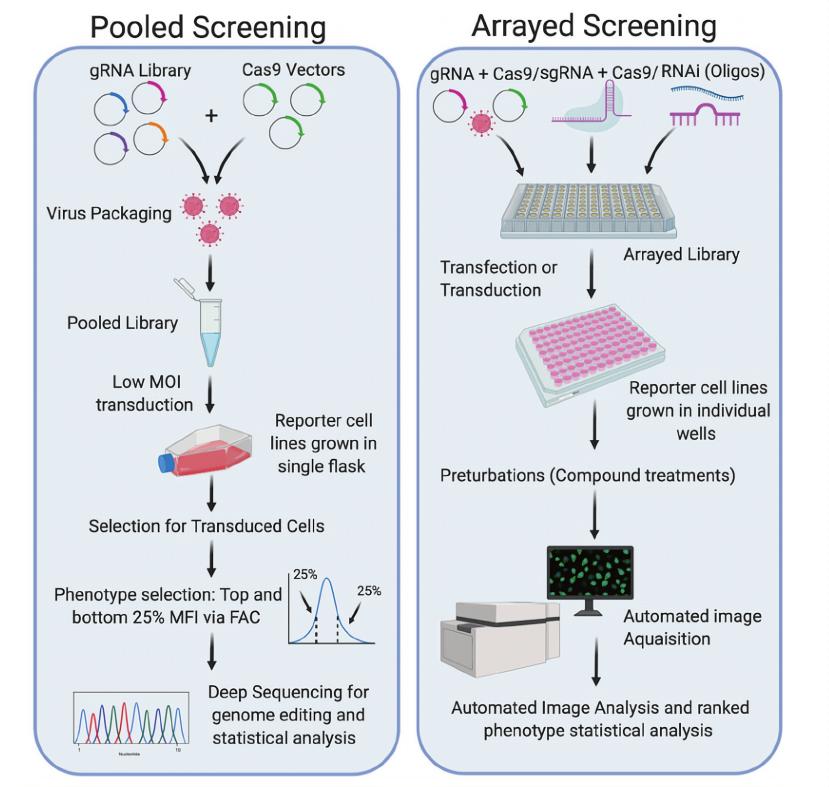T cells and the immune system usually have amazing potential to eliminate tumor cells in the body. The clinical success of CAR-T immunotherapy designed to enhance T cell function proves this therapeutic potential. Despite the remarkable progress made so far, only about 30% of patients can obtain treatment success, and extending success to more patients is still the top priority in this field. Studies have shown that T cell infiltration in tumors can improve the efficacy of checkpoint blockade therapy. Infiltration of T cells into tumors seems to be an important prerequisite for immune checkpoint blockade and successful CAR-T therapy. Preclinical models have proved that increasing the number of T cells in tumors can enhance the efficacy of immune checkpoint blocking. Therefore, increasing the infiltration of T cells into tumors may have beneficial therapeutic effects.
To this end, Creative Biolabs has developed an innovative method based on the gRNA library system to screen novel therapeutic targets in T cells that affect the infiltration of T cells into tumors. We have used a variety of cancer models to identify hundreds of T cell genes. When they are mutated, they can enhance the transport of T cells to the tumor, which in turn will cause larger T cells to kill cancer cells. Such modifications can enhance the success of chimeric antigen receptor (CAR) T cell therapy, especially in solid tumors, where the infiltration of T cells into the tumor is critical to success.
In recent years, gRNA-based tools have developed rapidly. These include gene-editing-based gene activation or inhibition. gRNA libraries for loss of function have been widely used to identify new biological mechanisms, such as drug resistance and cell survival signals. Gene-editing-based gene activation is very useful in screening function gains, and gene-editing-based gene inhibition is more powerful than RNA interference (RNAi) libraries in screening function loss. Positive selection using the gRNA library can detect surviving cells with specific conditions, such as drug therapy, and can easily elucidate the mechanism of resistance. Negative selection can effectively detect dead cells or slow-growing cells and can identify genes necessary for survival, which may be a promising candidate for molecularly targeted drugs. In addition, negative selection can be applied to synthetic lethal interactions, where the perturbation of two genes simultaneously leads to the loss of viability, but any single gene will not affect viability. This mechanism is very important for determining the best combination of molecularly targeted drugs. Survival coexisting genes in cancer cells can be identified using new methods, such as paired guide RNA systems and methods combined with single-cell RNA sequencing technology. These effective methods can elucidate interesting biological mechanisms and propose candidate targets for molecularly targeted drugs.
 Fig.1 General workflow of gRNA-library screens.1
Fig.1 General workflow of gRNA-library screens.1
The screen has been tested in lymphoma and melanoma xenograft models with and without PD-1 therapy.
Top 10 gene candidates are hypothesized to influence T-cell functions important for intratumoral infiltration.

Fig.2 Top 10 gene candidates hypothesized to influence T-cell infiltration.
For more detailed information, please feel free to contact us or directly sent us an inquiry.
Reference
For any technical issues or product/service related questions, please leave your information below. Our team will contact you soon.
All products and services are For Research Use Only and CANNOT be used in the treatment or diagnosis of disease.
 NEWSLETTER
NEWSLETTER
The latest newsletter to introduce the latest breaking information, our site updates, field and other scientific news, important events, and insights from industry leaders
LEARN MORE NEWSLETTER NEW SOLUTION
NEW SOLUTION
CellRapeutics™ In Vivo Cell Engineering: One-stop in vivo T/B/NK cell and macrophage engineering services covering vectors construction to function verification.
LEARN MORE SOLUTION NOVEL TECHNOLOGY
NOVEL TECHNOLOGY
Silence™ CAR-T Cell: A novel platform to enhance CAR-T cell immunotherapy by combining RNAi technology to suppress genes that may impede CAR functionality.
LEARN MORE NOVEL TECHNOLOGY NEW SOLUTION
NEW SOLUTION
Canine CAR-T Therapy Development: From early target discovery, CAR design and construction, cell culture, and transfection, to in vitro and in vivo function validation.
LEARN MORE SOLUTION